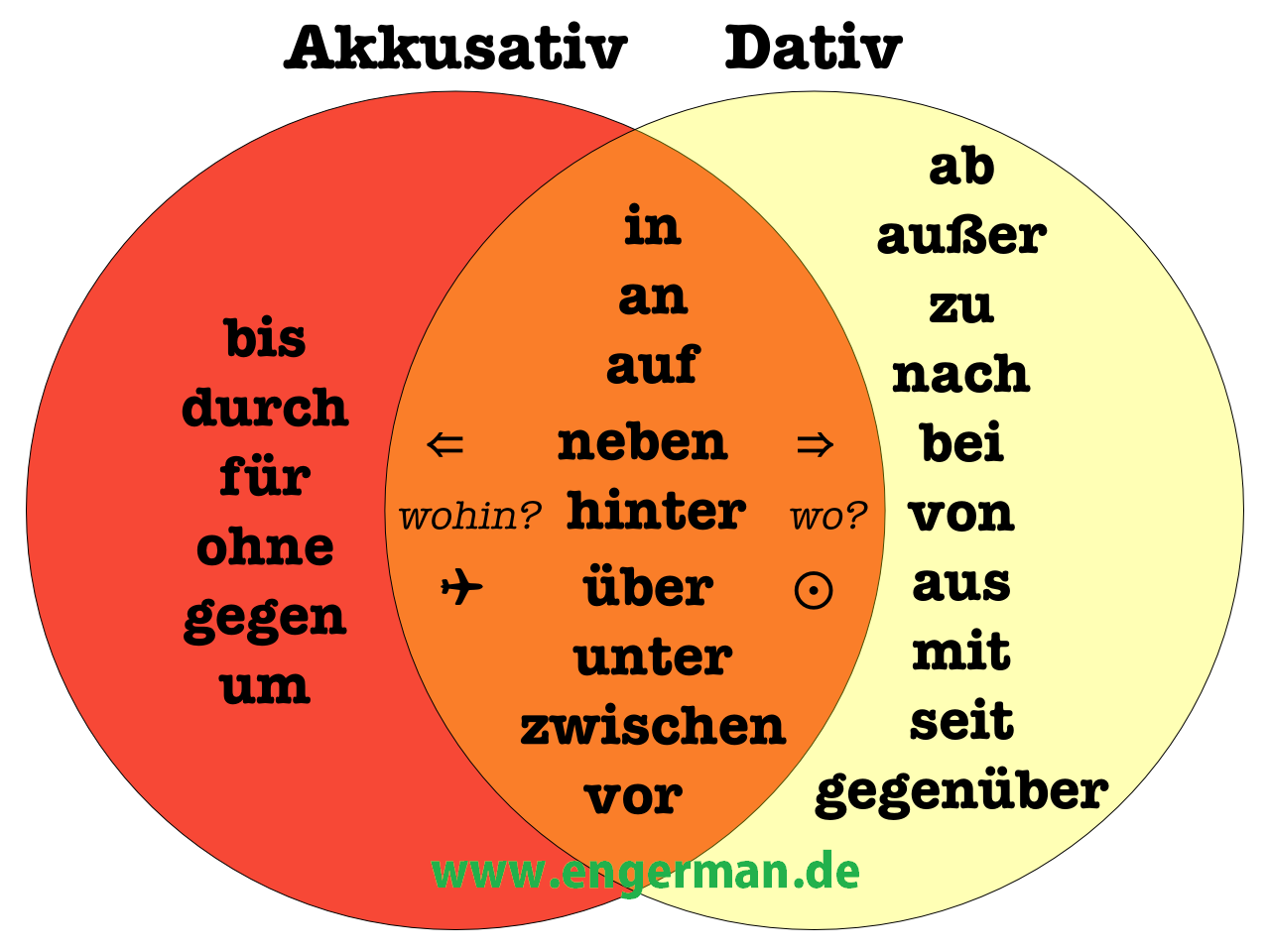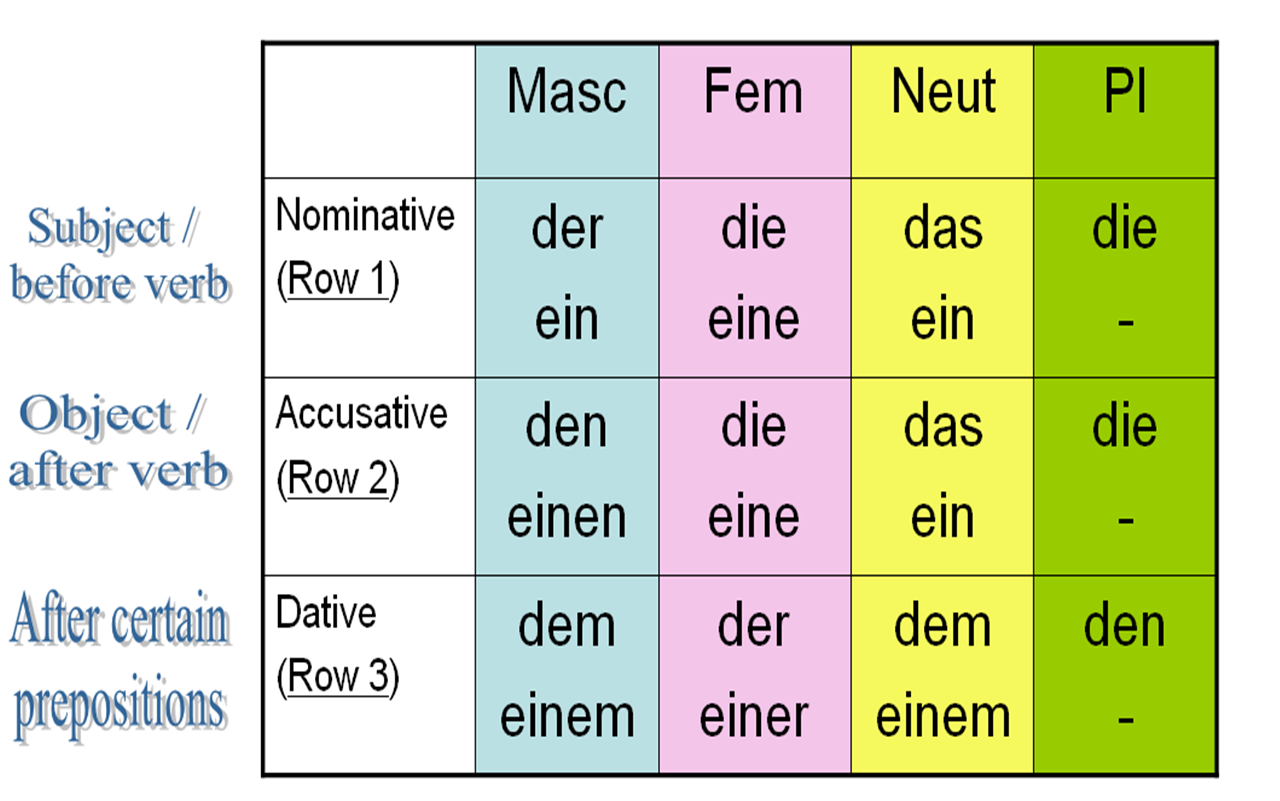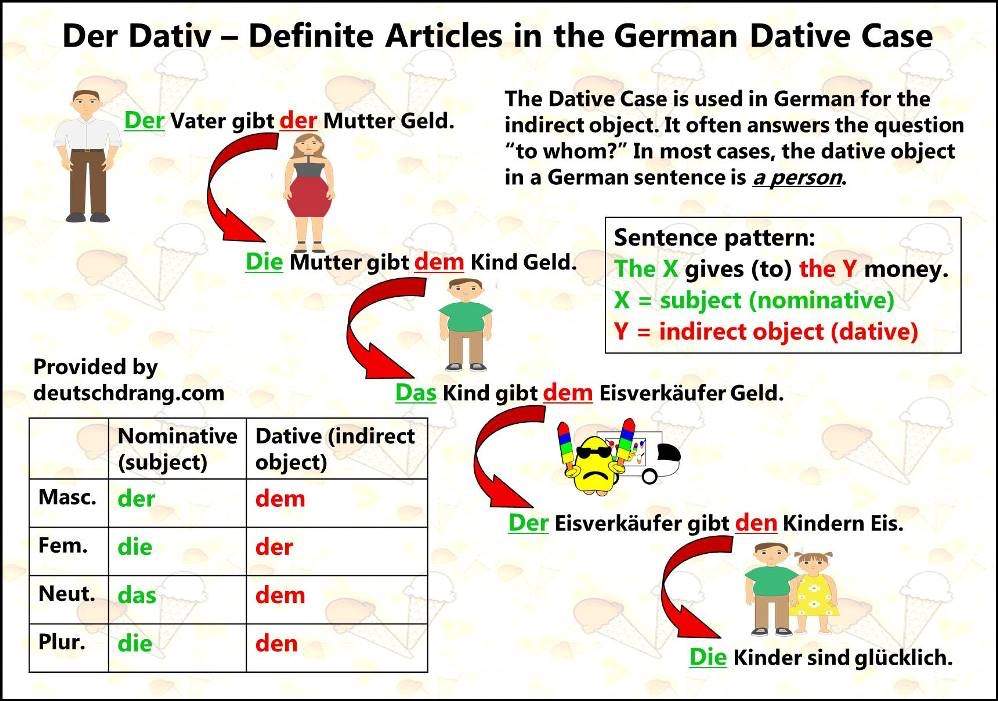
Direct and Indirect Object Akkusativ and Dativ Cases My Journey
Step 1 - Where is the subject? Step 2 - Is there a preposition in front of the noun? Step 3: Does the verb require a certain case? Step 4: Direct or indirect object? Does it work for the Genitive Case as well? Do you prefer to read this lesson Dativ oder Akkusativ? in German? Switch language now!

Präpositionen mit Dativ und Akkusativ Dativ und akkusativ, Dativ deutsch, Präpositionen
We created a comprehensive guide for you that includes a German cases chart and a breakdown of nominative, accusative, genitive & dative in German.

Dativ / Akkusativ German grammar, German language, Learn german
Examples - Verben mit Dativ und Akkusativ. The subject is, as always, the nominative complement.. The dative complement is normally the receiver of the action (indirect object).. The accusative complement is the thing being acted upon (direct object). „Der Mann gibt dem Kind den Ball." "Der Mann" is the acting person ⇒ Nominative The child is the receiver ⇒ Dative ⇒„ dem Kind "

präposition dativ akkusativ genitiv Google Search German grammar, Learn german, German study
We'll demystify the four cases with German preposition charts and other essential tools. Stay tuned to learn about: The nominative case, which focuses on the subject of a sentence. The accusative case, which deals with the direct object. The dative case, which highlights the indirect object. The genitive case, which shows possession and other.

Verben mitdativundakkusativ Dativ und akkusativ, Verben mit dativ, Dativ deutsch
Knowing when to use the dative and accusative in a German sentence is a major hurdle for many students. Equally as important is the sentence structure when using the accusative and dative cases.Compared to English, there are more options, depending on your word choice.

Idea by Michael Bachrodt on German Learn german, German language, German language learning
Put differently, when a sentence serves as a response to the interrogative pronoun "wohin" (where to), the preposition within it should be in the accusative case.Conversely, if the sentence is a reply to the interrogative pronoun "wo" (where), the preposition within it should be followed by the dative case.an (on, next to). Accusative:

Verben mit Dativ und Akkusativ Deutsch Viel Spass
The dative case ( dritter Fall - 3rd case - in German) shows that a noun is the indirect object of a sentence. An indirect object is a noun that's on the receiving end of something; it answers the question to who or what something is going — or with in some cases. For English speakers, this can be a little weird as we don't bother with.

Pin auf Learn German
If you are learning German as a foreign language, prepositions could be one of the trickiest things you have to deal with, as there are dative, accusative, genitive and two-case prepositions. In today's class we learnt about the two-case prepositions (Wechselpräpositionen) which are prepositions that can be followed by either dative or.

de a gestiona Concluzie scris der die das dativ und akkusativ Roti excitaţie Uneori uneori
Du kaufst deiner Tochter eine Geige. ( deiner Tochter = Dativ, eine Geige = Akkusativ) You buy your daughter a violin. (your daughter = dative, a violin = accusative) Caroline bringt dem Kunden den Salat. ( dem Kunden = Dativ, den Salat = Akkusativ) Caroline brings the customer a salad. (the customer = dative, the salad = accusative) Pronoun.

Nominativ , Akkusativ , Dativ
The answer is the accusative noun. You can find the dative noun by asking, "Who/what is getting something?" In the sentence "I bought my sister a house," the sister is the one getting something, and would therefore require dative case markers. These questions require you to identify and use both the accusative and dative cases.

Dativ oder Akkusativ Deutsch lernen mit Cartoons / 04 Deutsch lernen
a. einem. einer. einem. -. Accusative and dative are the eternal struggle when learning German. We go through the differences between accusative and dative in German.

Personalpronomen Im Nominativ Akkusativ Und Dativ Pronombre Personal Hot Sex Picture
This dative object is usually the only object in the sentence. Here's a list of frequently used German verbs that always take the dative case:-. German. English. jdm. absagen. to cancel on somebody /. to turn someone down. ähneln. to resemble / to look like.

Pin by Tatiana Nikonov on D Pronomen German language learning, Learn german, German grammar
We should define what accusative and dative mean. Accusative is the proper word to use when referring to the direct object of a sentence, whereas dative is used to indicate the indirect object. In simpler terms, accusative is used when the subject of a sentence is acting upon an object, while dative is used when the subject is acting upon or.

German Lesson 5 Akkusativ and Dativ(aka somehow direct and indirect objects) Language
How To Choose Between Dative And Accusative - With Exercises - Happy German. Do you struggle when it comes to using the Dative or the Accusative. In this guide you'll learn when to use which case!

Nominativ, Akkusativ , Dativ تعليم اللغة الالمانية الدرس السادس قواعد YouTube
In this video you are going to learn the difference between the German cases accusative and dative and also nominative: Akkusativ oder Dativ? Which one you n.

PPT Dativ / Akkusativ Präpositionen PowerPoint Presentation, free download ID5645270
Dative or Accusative? While moving, Selma and her father, Ibrahim, are considering the best way to load the furniture in the moving van. Read what they say. Write the articles in the blanks using the accusative or dative forms. Lies das Gespräch zwischen Selma und ihrem Vater.